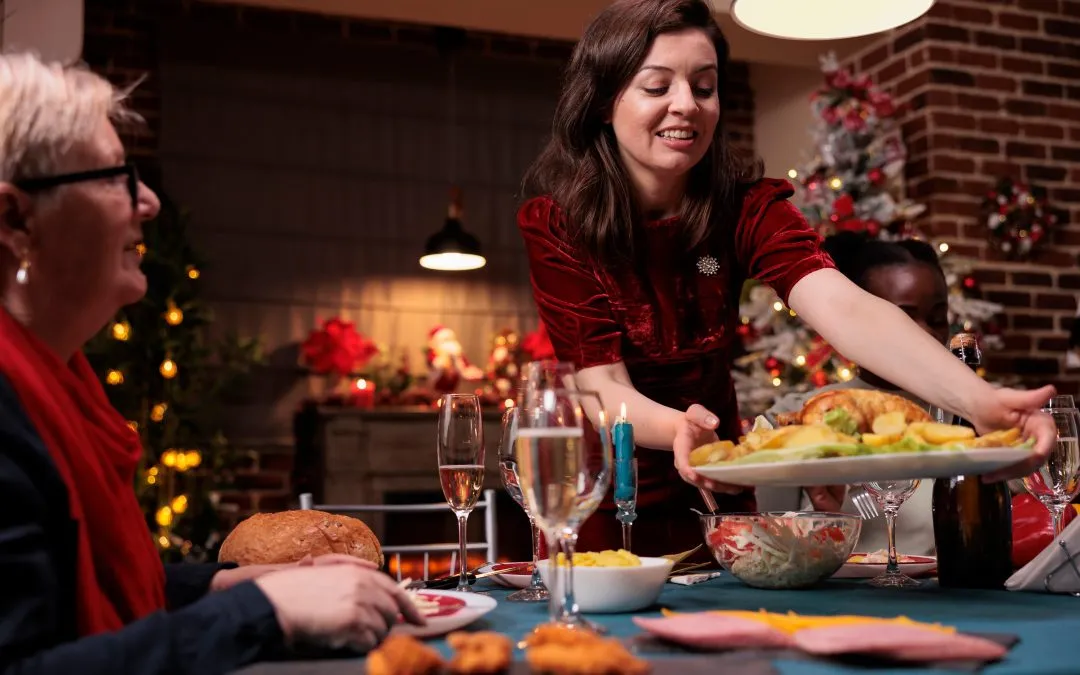
Keep holiday meals safe with tips for food prep and storage. Visit us for more tips and proper care in the case of getting a food-borne illness.
Holiday gatherings often involve large meals and plenty of food, increasing the risk of food-borne illnesses. By ensuring proper food safety during preparation and serving, you can help keep your guests safe. In Lenoir, NC, enjoy community traditions while preparing your meals—take a scenic stroll along the Greenway Trail, explore the downtown area’s holiday events, or shop for fresh, local ingredients at the Caldwell County Farmers Market. Balancing food safety with these festive activities can help ensure a joyful and healthy holiday season.
Why Is Food Safety Important for Large Gatherings?
Preparing food for a large number of people requires careful planning and attention to food safety. When you’re cooking and serving for large groups, it’s easy for food to stay in the “danger zone” for too long. The “danger zone” refers to temperatures between 40°F and 140°F, where bacteria like Salmonella and E. coli can multiply rapidly. Whether you’re roasting turkey, serving mashed potatoes, or offering a variety of desserts, bacteria can grow quickly if food is not stored or served properly. To prevent illness, it’s essential to follow safe food handling practices, keep food at the correct temperatures, and serve in smaller portions when possible.
What Are the Best Tips for Safe Food Preparation in Large Quantities?
Preparing large amounts of food requires extra vigilance to ensure the safety of your dishes. Here are some best practices for handling food in bulk:
- Plan for Safe Storage: Make room in your fridge and freezer to store leftovers and keep perishable items cold until it’s time to serve them. Always store raw meats separately from ready-to-eat foods to prevent cross-contamination.
- Pre-chill Ingredients: For cold dishes such as salads, chill all ingredients before combining them. This will help keep the finished dish at a safe temperature for longer periods.
- Prepare in Batches: Instead of making one large batch of food, prepare smaller portions. This ensures that food stays fresh and at the proper temperature, reducing the risk of contamination.
- Use a Food Thermometer: Make sure to use a thermometer to check that foods reach the proper cooking temperature. Poultry, such as turkey, should reach an internal temperature of 165°F to ensure it is safe to eat.
How Should I Serve Food Safely at a Holiday Buffet?
Buffet-style setups are popular for holiday meals, but they can increase the risk of bacterial growth. Here are tips to make sure your buffet is safe for everyone:
- Use Chafing Dishes or Ice Trays: Keep hot foods above 140°F using chafing dishes, and ensure cold foods stay below 40°F by placing them on ice. These simple steps can help keep your food safe throughout the gathering.
- Replace Dishes Regularly: Instead of leaving the same dish out all day, replace it every two hours or keep smaller portions available while storing the rest in the fridge. This helps minimize the time food is left out at unsafe temperatures.
- Encourage Hand washing: Encourage your guests to wash their hands before eating. Place hand sanitizer stations nearby and make sure guests understand the importance of hygiene in preventing food-borne illnesses.
What Are Signs That Food May Be Unsafe to Eat?
Food-borne bacteria often don’t alter the taste or smell of food, so it’s important to look for other signs that food may have spoiled:
- Room Temperature Items: Any food that has been sitting out for more than two hours should be discarded, especially if it is perishable. Bacteria grow quickly at room temperature.
- Strange Odor: If a dish has an off or sour smell, it may be a sign that bacteria have started to grow, particularly in high-risk foods like meats, dairy, or egg-based dishes.
- Changes in Texture or Color: If food looks slimy or discolored, it’s safer not to eat it. Changes in the food’s appearance can be a sign of spoilage or bacterial growth.
When Should I Visit Urgent Care for Food Poisoning Symptoms?
After a holiday meal, if you or a guest experience symptoms like vomiting, diarrhea, or stomach cramps, it could be a sign of food-borne illness. If these symptoms persist or worsen, it’s important to seek medical care. Here are some instances when visiting our urgent care clinic is recommended:
- Symptoms Last Longer Than 24 Hours: While food-borne illnesses usually resolve within a day or two, symptoms that persist longer could indicate a more serious infection. If symptoms last for more than 48 hours, urgent care can help.
- Dehydration: Food-borne illnesses can cause dehydration, especially when vomiting and diarrhea are persistent. Our team of providers can administer IV fluids to help rehydrate and manage symptoms.
- High Fever or Bloody Diarrhea: A high fever combined with symptoms like bloody diarrhea could indicate a serious infection, such as Salmonella or E. coli. These conditions require medical attention immediately.
Preparing and serving food for a large holiday gathering requires extra care to ensure safety and minimize the risk of food-borne illness. By planning for safe storage, ensuring food is cooked to the right temperatures, and taking precautions with buffet-style serving, you can reduce the chances of illness. If food-borne symptoms occur, seeking prompt care from AFC Lenoir can help prevent complications and get you back to enjoying the holiday season.


